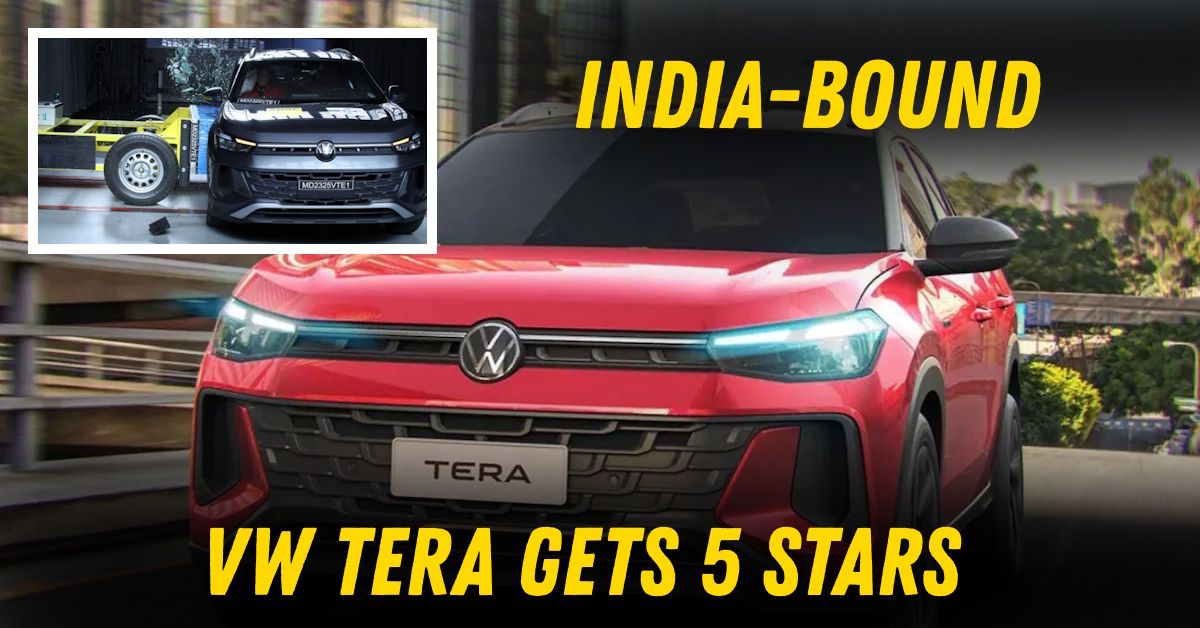India-bound VW Tera Achieves 5-star Latin NCAP Safety Rating


The upcoming Volkswagen Tera SUV has secured a perfect five-star rating in the Latin NCAP crash tests, establishing its credentials as a robust offering in the competitive sub-compact SUV segment. The Brazil-manufactured Tera, which is expected to make its way to Indian shores by 2026, demonstrated exceptional protection levels for both adult and child occupants, scoring 89.88% and 87.25% respectively. This stellar performance underscores Volkswagen's commitment to safety as it prepares to challenge established players in the bustling sub-4 metre SUV market.
The Tera's safety rating comes at a time when Indian consumers are increasingly prioritising vehicle safety, with recent regulatory changes mandating six airbags as standard across all passenger vehicles. As Volkswagen's most affordable SUV offering, the Tera is positioned to capitalise on this growing safety consciousness while delivering the brand's signature German engineering in a compact package.
When evaluating the Tera's five-star rating, it's important to understand the distinction between Latin NCAP and Global NCAP testing protocols, as they differ in stringency and scope. Latin NCAP, which focuses on vehicles sold in Latin America and the Caribbean, has evolved to become more comprehensive and demanding than Global NCAP in several aspects.
While Global NCAP initially relied primarily on frontal offset crash tests, Latin NCAP has expanded its testing protocols to include side impact, side pole impact, whiplash tests, and pedestrian protection assessments. This broader range of tests creates a more challenging environment for vehicles to achieve top ratings. Additionally, Latin NCAP requires Electronic Stability Control (ESC) for vehicles to qualify for four or five stars, a requirement that Global NCAP only adopted in its updated protocols from July 2022.
Another key difference is that Latin NCAP places greater emphasis on advanced driver assistance systems (ADAS) and autonomous emergency braking (AEB) in its scoring methodology. The Tera's AEB system, which is standard in most markets, demonstrated robust responses in all test scenarios, nearly achieving a full score in Latin NCAP’s evaluation.
Delving deeper into the crash test results reveals the comprehensive nature of Volkswagen's safety engineering. The Tera underwent rigorous assessment across multiple crash scenarios, including frontal impact, side impact, side pole impact, and whiplash tests. The bodyshell was rated as stable and capable of withstanding further loadings, a crucial factor in real-world crash scenarios where structural integrity can mean the difference between minor and severe injuries.
In the frontal offset deformable barrier test, both driver and passenger head, neck, and knee protection was rated good, though driver chest protection was deemed marginal compared to the passenger's good rating. The side impact tests showed good protection for the head, abdomen, and pelvis, with adequate protection for the chest. These results paint a picture of a vehicle designed with occupant safety as a fundamental priority rather than an afterthought.
For families, the child occupant protection score of 87.25% offers reassurance, with the ISOFIX anchoring system performing admirably in dynamic tests. The Tera’s child seats, installed rearward facing using ISOFIX anchorages and support leg, prevented head exposure while offering full protection to the head, though chest protection was noted as limited in some scenarios.
Beyond passive safety measures, the Tera comes equipped with an impressive array of active safety features. Standard across all variants are six airbags and Electronic Stability Control (ESC), complemented by seatbelt reminders, pretensioners, load limiters, and a Speed Assist System.
What could set the Tera apart in its segment is the inclusion of Advanced Driver Assistance Systems (ADAS)—not all its competitors offer it currently, though the situation might change by the time it arrives. The Autonomous Emergency Braking (AEB) system, which is standard in most markets, demonstrated robust responses in all test scenarios. This technology can automatically apply the brakes if it detects an imminent collision, potentially preventing accidents altogether.
Higher variants offer additional ADAS features like Lane Keeping Assistant, Active Lane Change Assistant, Blind Spot Detection, and Parking Assist. While some of these features are optional globally, their presence signals Volkswagen's intent to bring premium safety technology to the mass market segment.
When the Tera arrives in India, expected around 2026, it will be underpinned by the MQB A0 IN platform, the same architecture that supports the recently launched Skoda Kylaq. This India-specific platform has been developed to meet local requirements while maintaining global standards of safety and performance.
Power is likely to come from a 1.0-litre TSI petrol engine, though with slightly different tuning than its Skoda cousin. While the Kylaq produces 114bhp and 178Nm of torque, the Tera is expected to offer around 109bhp and 165Nm. Transmission options will likely include a 6-speed manual and a 6-speed torque converter automatic.
Inside, expect a functional yet premium cabin featuring a 10.25-inch touchscreen infotainment system, digital instrument cluster, wireless smartphone charging, ambient lighting, and possibly even ventilated seats in top variants. The interior design language will follow Volkswagen’s clean, minimalist approach with high-quality materials and thoughtful ergonomics.
The Tera will be up the likes of Tata Nexon, Maruti Suzuki Brezza, Hyundai Venue, and Mahindra XUV3XO. With its combination of German engineering, comprehensive safety features, and modern technology, the Tera presents a compelling alternative for buyers seeking something different from the usual suspects.
Pricing will be crucial to the Tera’s success, with estimates suggesting a starting price of around ₹8 lakh. Only time will tell whether it unsettle the segments leaders or just take a bite of its sibling, Skoda Kylaq’s, pie.